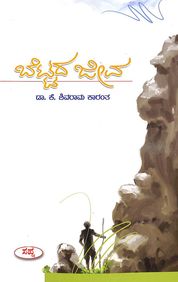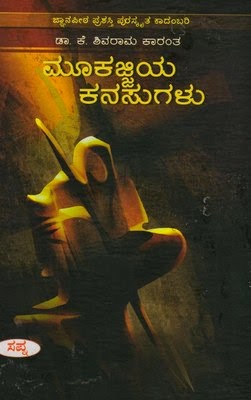Title: Bettada
Jeeva
Author: K.
Shivaram Karantha
Publishers: Sapna
Book House
Genre: General
Fiction
Pages: 150
There are few
book which haunts you for some time though you’ve finished reading it. Bettada
Jeeva is one such book where it is almost impossible to forget the characters
or the story as such. Set up in a remote mountain village of South Karnataka,
the book captures the scenic beauty of the entire village and mountain as well
as the subtle tragic events of a family. This book is short with just 150
pages. The story that the author had written is brilliant in many aspects leave
alone the main plot of the novel.
The book has a
prominent plot which carries the story till the end with its elusive narration.
There are multiple protagonists in this novel and the main characters are the
old couple Gopala Bhat and his wife Shankari and a visitor guest to their house
Shivarama. The story appears as simple as it sounds in the first few pages of
the book, but, as you read through it, it has something else to offer. The tragic
and secluded life of the elderly couple will remain a focal point in this
novel.
The story
begins when Shivarama, another protagonist in the novel loses his way towards
his hometown Puttur. While roaming in the forest pathway to decide which way to
go, two strangers appears who were heading to a different village and offers
their help to get Shivarama to a nearby village. As it was already night and
there was no way that Shivarama could get any bullock cart to find his way,
agrees to go along with those men and finally lands in the house of the elderly
couple.
Shivarama
received a warm welcome from the oldies and they treat him as one of their own
relative. They offer him the best food and shelter and knows his whereabouts.
As they begin their conversations, Shivarama was awestruck by the liveliness of
these old couple and tries to get along with them. He speaks about their life
in that secluded village and in that single house. Shivarama learns that, the
old couple had two children, a boy and a girl. While the girl married at any
early age and due to the complications in her pregnancy, the girl loses her
life. While the younger son was the only solace for these couple, but he turns
out to be a bigger disappointment in their life.
To get higher
education, the son leaves their hometown and heads to Mumbai. Months and years
passed and there was no sign of him. The couple became old and vulnerable
waiting for their son’s arrival. 12 years have passed since then, and there was
not even a single letter from their son. Dejected by their son’s behavior, the
old couple comes to term with the situation and continues to live their lives
by accommodating any new guests in their villages and treating them as if their
own kith and kin has arrived. This was a turning moment for Shivarama and he
decides to stay in the house for few more days to hear the couple narrate their
entire story.
As the story
drifts further, there are other short tales of how the elder couple adopted an
orphan person Narayana and raised them as their own son. They got him married
and provided him the land to till and build his own life. Now, this orphan
person has two kids, which the elder couple feels them as their own grandchildren.
There are also few short stories of visiting the deep forests, hunting down a
tiger in the traditional village way and roaming around the water falls deep
within the forests and so on.
My Rating:
5/5


